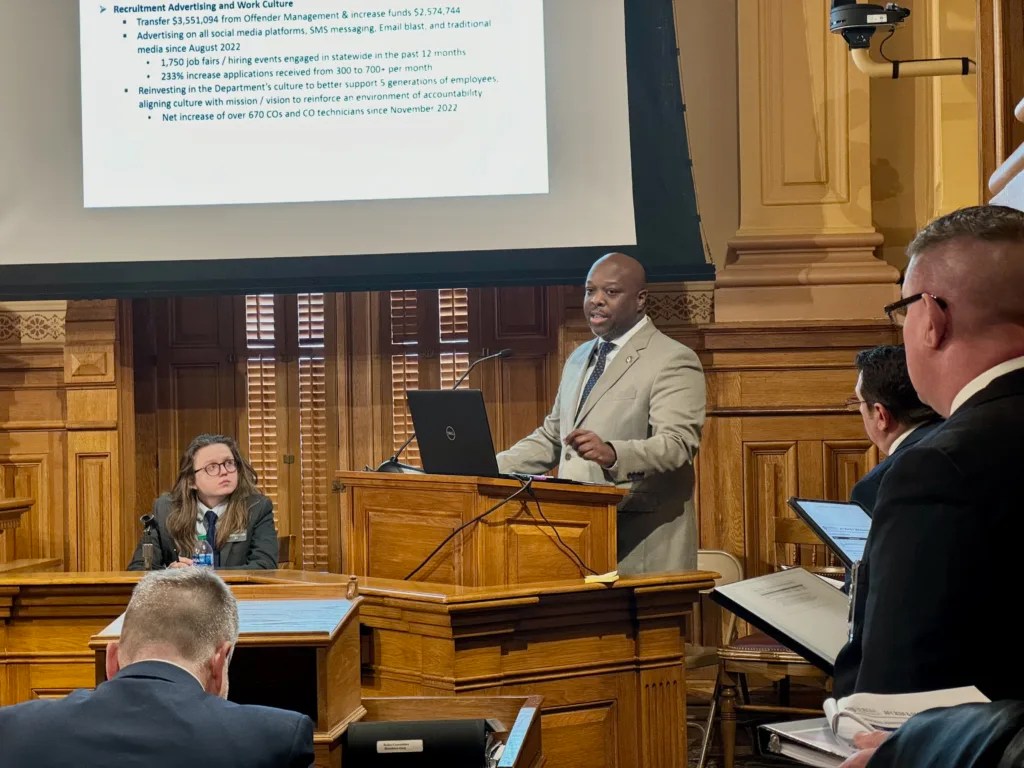Stay ahead of the curve as a political insider with deep policy analysis, daily briefings and policy-shaping tools.
Request a DemoDay 3 of budget hearings: Keeping the criminal justice workforce from flying the coop

Shawanda Reynolds-Cobb, Commissioner of the Department of Juvenile Justice, discussed her department's budget proposal at the Joint Appropriations hearing on Jan. 18, 2024. (Credit: Jill Jordan Sieder)
The third and final day of budget hearings at the state Capitol featured law enforcement and corrections officials as well as public defenders and prosecutors.
A similar theme ran through many of their presentations: Employees do tough and challenging jobs in difficult, dangerous, sometimes violent environments; they’re chronically understaffed; and the pay increases and new funding for personnel, equipment and facilities proposed by Gov. Brian Kemp are sorely needed and greatly appreciated.
Probation officers, who spend on average of 4.8 years with the people they supervise, often experience “vicarious trauma” from the interactions they have on site visits, and their exposure to the struggles of ex-offenders and their families, said Michael Nail, commissioner of the Department of Community Supervision. “They end their days with very few good stories.”

Kemp has proposed $3,000 pay increases for law enforcement officers and a 4% cost of living increase, which collectively would add another almost $14 million to the fiscal year 2025 budget. He said an additional $2 million to hire 25 community supervision aides and seven community coordinators will free up probation officers from administrative duties and allow them to spend more time in the community to deal with “homelessness issues, substance abuse issues, employment issues” and other challenges.
The Department of Community Supervision is also seeking to replace 111 vehicles at a cost of $5.7 million.
Nail noted that Georgia has the highest number of adults under supervision for felony offenses in the U.S., and that those 191,000 people are also serving the longest probation sentences in the country (six years, on average). Georgia probation officers have an active caseload of 80 to 90 people each, which has ticked down from a high of 200, thanks in part to legislation that has allowed many felons with good behavior to terminate their sentences early, said Nail.
Contraband crackdown and more health care in prisons
Department of Corrections Commissioner Tyrone Oliver said his officers “have the toughest job in law enforcement” in Georgia and “work in the most dangerous conditions” in the state’s prisons, where 75% of the population are violent offenders, and at least 15,000 are gang-affiliated.
Correctional officers are in chronically short supply — the state currently needs about 2,000 officers in its 91 facilities, and the turnover rate in 2023 was 32%, Oliver said. He is requesting $6.9 million for a recruitment and advertising campaign to help fill open positions. The salary increases proposed by the governor, he added, will increase starting pay for correctional officers to $44,000 from $40,000.
The department is also seeking $6.9 million to contract with private prisons to supply additional 400 beds, $5.6 million for drone detection and radar systems and $850,000 to interdict cell phones.

The governor’s budget proposal includes $17.5 million for the Department of Corrections to renovate and “harden” older prisons. Hardening involves making physical changes to buildings and expanding technology to eliminate contraband.
The department is seeking $65 million for health and pharmacy contracts in FY2024, and $72 million in FY2025, to address issues facing an aging prisoner population. More than 18,000 inmates have chronic illnesses including heart disease, diabetes, cCancer and HIV, said Oliver, adding that with a current average inmate sentence of 32 years, and the ever-higher cost of medical staffing, he expects health care costs to continue to rise.
On a positive note, Oliver requested $172,000 for both FY2024 and FY2025 to continue vocational education contracts with the state’s technical schools. In 2023, 49,000 Georgia offenders were enrolled in technical and higher education courses, and 38,000 completed their certificate programs, including 62 who earned associate degrees and 24 who earned bachelor degrees. An additional 1,531 people earned high school equivalency diplomas.
A therapeutic approach with troubled youth
The Department of Juvenile Justice also has been plagued by a high turnover rate in recent years (73% among juvenile corrections officers in 2022). Commissioner Shawanda Reynolds-Cobb said, “We need to work on our culture as part of our retention strategy for employees.”
To that end, she said, the department has held town hall meetings and focus groups for staff, and is revamping its recruitment and retention strategy. She said the $1,000 bonuses for all staff in FY2024 and the 4% raise in FY2025 will provide some momentum. In FY2024 she’s also asking for more comfortable vests, body cameras and laptops for officers at a cost of about $750,000, and $75,000 for tablets for a mobile grievance system.
The department is also trying to change the way it handles “the young people we serve,” said Reynolds-Cobb. That includes switching from traditional correctional uniforms in youth detention centers to khaki pants and polo shirts. The switch will save the state $392,000, said Reynolds-Cobb.
Among the other FY2024 budget requests from the department are $104,000 for additional music studios for inmates at its six youth development campuses and $600,000 for mobile welding labs in Macon, Eastman and Augusta in 2025 so that youth can develop “a skillset to be gainfully employed” when they leave confinement.
Reynolds-Cobbs noted that youth enrolled in high school programs within the Department of Juvenile Justice make up the state’s “181st school district.” In FY2023, their education programs produced 31 high school graduates, 40 GED graduates and 30 students earned technical certificates.
Beyond pay increases and bonuses, the big-ticket items in the FY2025 budget include $14 million for facility repairs, and $1.8 million for the design of an all-female facility in Macon. Reynolds-Cobb said the department plans to build a new $52 million, 48-bed youth development campus in Milledgeville to replace a current facility that has “no cafeteria or space for education and programming.”
Overall, the Department of Juvenile Justice budget will increase by $2.7 million to $146 million in FY2024, and to $158 million in FY2025 if the governor’s budget proposal is approved by the General Assembly.
Read these related stories:
Have questions, comments or tips? Contact Jill Jordan Sieder on X @journalistajill or at [email protected].
And subscribe to State Affairs so you do not miss an update.
X @STATEAFFAIRSGA
Facebook @STATEAFFAIRSGA
Instagram @STATEAFFAIRSGA
LinkedIn @STATEAFFAIRS
Professionals still face licensing delays amid state’s transition to online system
The Gist Georgia’s professionals and business owners are still struggling to obtain professional licenses in a timely manner. As the Secretary of State’s Office rolls out its new Georgia Online Application Licensing System to expedite the process, the efficiency of this new process is being put to the test. What’s Happening Thursday morning at the …
Controversy over AP African American Studies class grows
Rashad Brown has been teaching Advanced Placement African American Studies at Atlanta’s Maynard Jackson High School for three years. He’ll continue to do so — even though the state’s top education official removed it from the list of state-funded course offerings for the upcoming school year. While Brown prepares to start teaching his class on …
Students, teachers, lawmakers blast decision to end AP African American history classes
ATLANTA — A coalition of lawmakers, civil rights leaders, clergy, educators and students Wednesday called on the state’s education czar to rescind his decision to drop an advanced placement African American studies class from the state’s curriculum for the upcoming school year. “This decision is the latest attack in a long-running GOP assault on Georgia’s …
Kamala Harris’ presidential bid reinvigorates Georgia Democrats
Georgia Democrats have gained new momentum heading into the November election, propelled by President Joe Biden’s decision to bow out of his reelection bid and hand the reins to Vice President Kamala Harris. The historic decision, announced Sunday, is expected to prove pivotal in the national and state political arenas and breathe new life and …




